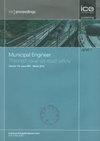寻找有效的参数来缓解大学附近的交通拥堵
IF 0.8
4区 工程技术
Q4 ENGINEERING, CIVIL
Proceedings of the Institution of Civil Engineers-Municipal Engineer
Pub Date : 2022-10-05
DOI:10.1680/jmuen.22.00009
引用次数: 1
摘要
本文旨在评价不同参数对高校周边交通拥堵的影响。根据模型的输出,可以提出减少交通拥堵的经济对策,特别是在发展中国家。使用结构方程模型来评估学生特征、不同模式特征、环境条件以及日常需求变化与交通拥堵之间的相关性。伊朗克尔曼大学的Shahid Bahonar被认为是一个案例研究。结果表明,首先要降低需求。为此,必须重新安排课程,以便在一周内更有效地分配课程。虚拟课程可以更频繁地用作传统校园课程的替代品。应该通过减少等待时间和费用,并提高其安全性来增加使用公共汽车的可能性。同样,出租车的使用可以通过改善安全性和等待时间来增加。为了减少使用私家车的可能性,定价策略必须对使用大学停车场设置更多限制。本文章由计算机程序翻译,如有差异,请以英文原文为准。
Finding effective parameters for mitigating traffic congestion near universities
This paper intends to assess the effect of different parameters on traffic congestion around universities. Based on the model outputs, it is possible to propose economic countermeasures for reducing traffic congestion, especially in developing countries. Structural equation modelling was used to assess the relevance between students’ characteristics, different modes’ features, environmental conditions, and daily demand variations with traffic congestion. Shahid Bahonar University of Kerman in Iran was considered as a case study. The results showed that it is necessary to decrease the demand first. For this purpose, rescheduling courses is essential to distribute classes more effectively within a week. Virtual classes can be used more frequently as a substitute for traditional on-campus courses. The probability of using buses should be increased by reducing waiting time and fares, and promoting their safety. Similarly, taxi use can be increased by improving safety and waiting time. To reduce the likelihood of using private cars, pricing strategies must establish more limitations for using university carparks.
求助全文
通过发布文献求助,成功后即可免费获取论文全文。
去求助
来源期刊
CiteScore
3.70
自引率
0.00%
发文量
15
审稿时长
>12 weeks
期刊介绍:
Municipal Engineer publishes international peer reviewed research, best practice, case study and project papers reports. The journal proudly enjoys an international readership and actively encourages international Panel members and authors. The journal covers the effect of civil engineering on local community such as technical issues, political interface and community participation, the sustainability agenda, cultural context, and the key dimensions of procurement, management and finance. This also includes public services, utilities, and transport. Research needs to be transferable and of interest to a wide international audience. Please ensure that municipal aspects are considered in all submissions. We are happy to consider research papers/reviews/briefing articles.

 求助内容:
求助内容: 应助结果提醒方式:
应助结果提醒方式:


